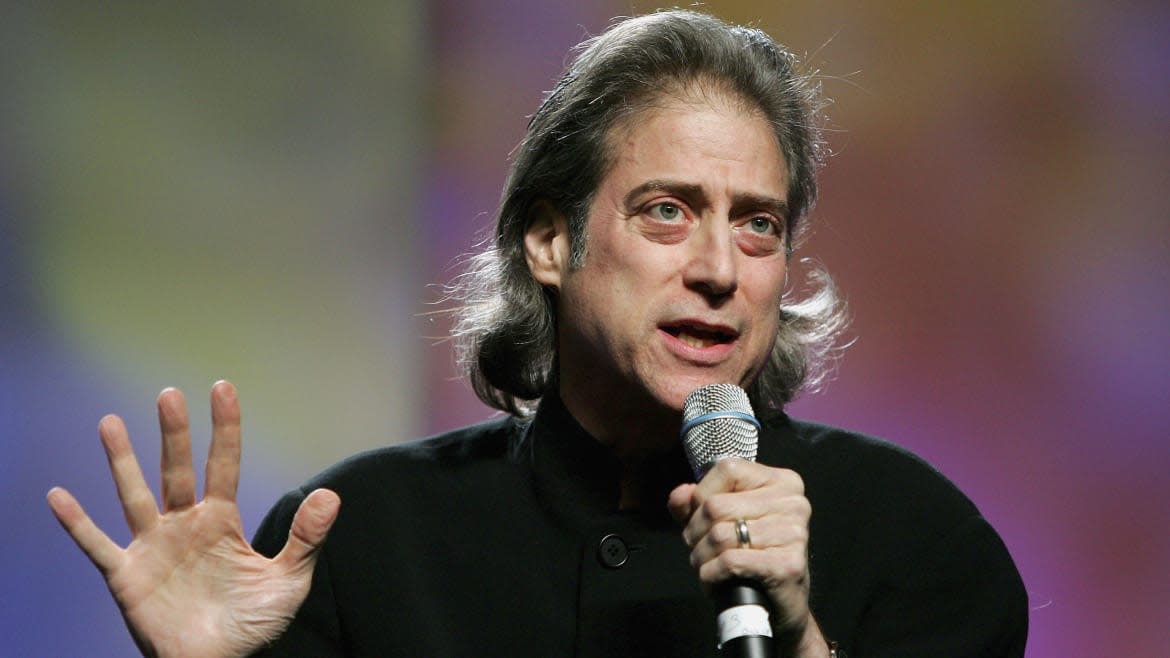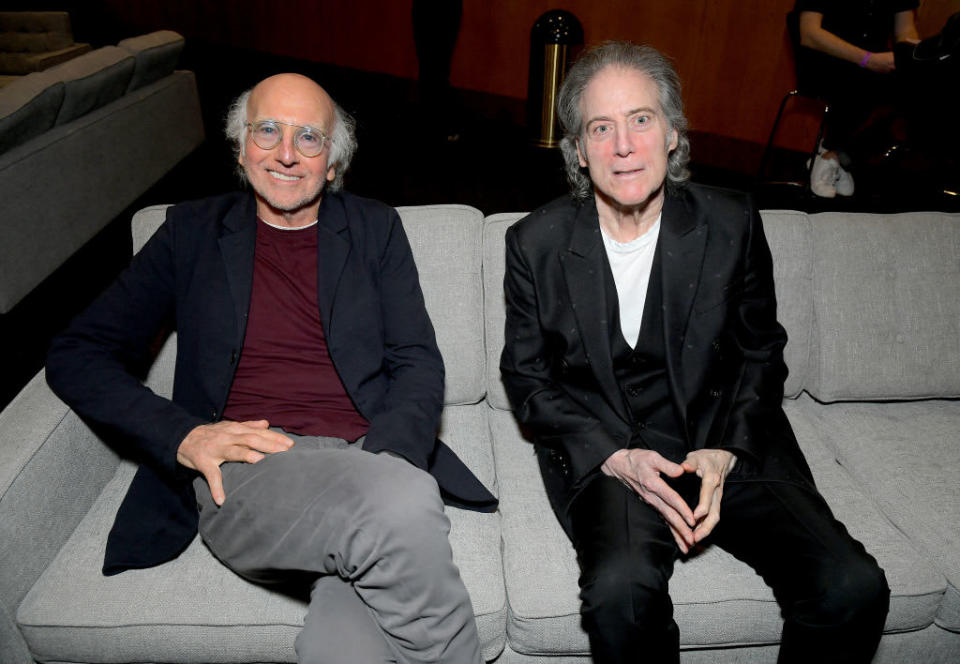Richard Lewis Spent His Life Obsessing Over His Death

Eighteen years ago this month, I first had the chance to speak to Richard Lewis. Or, should I say, I listened to Lewis as the comedian launched into one riff after another for an hour over the phone in February 2006, giving me far more quotable material than my editors at the Boston Herald would ever publish.
Looking back on it now, upon hearing Lewis had died today of a heart attack at age 76, what stood out remarkably was something he said in passing about his legacy.
“What humbled me more than anything,” Lewis told me in 2006. “When Walter Matthau died. Everybody loved him, but it was 12 seconds in an hour on the news, and they cut to a traffic jam … I thought they would just talk about Matthau and forget about the traffic or the weather for the night. So I don’t take myself that seriously.”
That might come as a shock to anyone who remembered seeing or hearing him onstage or on TV throughout the years, from his first breakthrough in the 1970s (captured in the book, I’m Dying Up Here: Heartbreak and High Times in Stand-up Comedy's Golden Era), all the way up to this year, watching him laugh and argue with his real-life BFF Larry David in the 12th and reportedly final season of HBO’s Curb Your Enthusiasm.
“From 23 on, I needed absolute validation about myself,” Lewis told me.
He was 23 when he filmed HBO’s annual “Young Comedians” special, airing in 1981 on a showcase that also included an equally-unknown Jerry Seinfeld. HBO subscribers were introduced to a young comedian full of self-doubt from the get-go. “This is a frightening profession. I was a schmuck. I could’ve been a caterer, I realize now,” Lewis joked. In that set, he also joked about going to therapy, four decades before it became commonplace for comedians to cop to getting help for their mental and emotional health.
Larry David Pens Heartbreaking Tribute to ‘Curb’ Co-Star Richard Lewis
He became a frequent guest on the late-night TV circuit. On a 1983 appearance on Late Night with David Letterman, posted Wednesday to YouTube in his tribute, Lewis joked about being a hypochondriac: “A friend of mine sent me, I think he made up a hypochondriacs coloring book. It had, like, outlines of healthy people, I would just color in problems all day.”
Paranoia and neurosis became a trademark of Lewis’s act. In his performance on a Comic Relief special in the late 1980s, he announced he felt off because his therapist had just retired. “She was only 24. I guess I burned her out real fast,” he quipped.
And when he recorded his 1985 Showtime special, I’m In Pain, he worried about being childless in his 30s, becoming an old dad, and how that led him to fret about dying.
“I don’t want to die yet. I don’t know anything!” he joked. “I had this dream of being on the deathbed but I have to be surrounded by pals who have to just give me as much info as fast as possible, otherwise I feel I’ll look like an idiot when I die!”
Despite the neurotic pacing and nervous tic of running his hand up through his hair, Lewis nabbed a starring role in an ABC romcom series opposite Jamie Lee Curtis, Anything But Love, which aired for four seasons from 1989-1992.
In a lengthy tribute posted to Instagram Wednesday, Curtis recalled her introduction to the budding comic—and the moment he earned the part as her co-star.
“I remember exactly where I was when I saw a billboard of him about a stand up special on Sunset Boulevard when we were casting the ABC pilot Anything But Love and asked the casting people to bring him in to audition to play my best friend/maybe boyfriend, Marty Gold. I thought he was handsome,” Curtis wrote. “He got the part when I snort laughed when he mispronounced the word Bundt cake.”

Larry David and Richard Lewis attend a Curb Your Enthusiasm panel.
In a 1993 interview with Penthouse, Lewis recalled: “As far as my material, I went onstage to talk about myself. And it wasn’t for the money — it was to have people who would listen to me. I think it probably evolved from feeling that I was not listened to by enough important role models while I was growing up. And when I had an audience and a microphone, it slowly dawned on me that I could express what I wanted to. The lucky part of it is, I had some sort of knack for turning phrases about my feelings. And it was fairly obvious to me a year or two into my work that I cared much more talking about feeling lonely than describing a department store.”
He recalled standing on the corner of Sunset Boulevard in Los Angeles, hearing young couples in a passing car shout out to him a catchphrase from his 1985 Showtime special, I’m In Pain. That moment eased his pain.
So, too, did getting clean and sober. Lewis was open about recovery and clocked three decades of sobriety by the time he died.
“I was hell-bent on being honest as a comedian from the get-go.” Lewis said in a 2017 CNN interview. “And I was. But it wasn’t until I admitted that I was a drunk and an alcoholic that, sex, you can be addicted to anything, really. And when I got clean and sober is when my comedy really took off for me personally because then I was really myself onstage.”
And yet, when the Washington Post profiled Lewis in 2020, he still felt a need to balance his current gratitude with regrets for his upbringing. “No, I’m not a very happy man. I’m thrilled to be alive. I’m grateful for who’s in my life. I’ve got great friends, a great wife, a dog, and I have a great career, but. . . But there’s just a part of me that’s always going to be never totally happy,” he said, “and I think that has a lot to do with my childhood.”
Comedy gave him the love and approval he couldn’t get at home, even if he often joked about the “date from hell” or ___ “from hell” that became popular slang, and even if his fellow members of the Friars Club decided the best way to honor him while he was still alive and the club was still kicking was to name the basement men’s room for him.
Jeff Abraham, Lewis’s longtime publicist, told The Daily Beast that he saw Lewis last month at a promotional photoshoot for Curb in West L.A., where Lewis joked with Larry David and delivered zingers about the shoot location, the family-owned eatery John O’Groats.
Larry David Pens Heartbreaking Tribute to ‘Curb’ Co-Star Richard Lewis
Lewis sent Abraham a thank-you note the following day, in which he acknowledged the bleakness around the world as well as the seriousness of his illness. “These days we all have to find gratitude to sustain any sort of optimism,” Lewis wrote. “My last 4-5 years have been, and are challenging. My symptoms from Parkinson’s, although having a day off for the photo shoot, are always lurking. It’s very difficult after a lifetime of stand-up, acting and writing, always busy, to now having to slam on the brakes. It’s a day at a time (for us all).”
Abraham said the final text he received from Lewis read simply: “Xx.”
“Richard was a class act and as they say in Yiddish, a real mensch,” Abraham said.
What kept him going, personally and professionally, in his final decade was his friendship with real-life BFF Larry David, which they captured over multiple seasons of Curb that sparkled in a way no other scene partner could with David. Because their rivalry was real and their friendship so sincere, their onscreen arguments crackled more than the others.
An early episode found Lewis begging David to change his outgoing answering machine message, claiming he’d copied Lewis’s message. Grasping for an upper hand, Lewis claimed he needs this win: “My parents are dead! You have a family.” David giggled as he mockingly repeated the words back to Lewis.
In season five, David agrees to donate a life-saving kidney to Lewis, prompting Lewis to say: “Larry, I’m too weak to really express it and articulate it, but this is the greatest thing that anyone’s ever done for me.” Of course, seconds later, the pair begin arguing while being wheeled side-by-side down the hospital floor to surgery over a golf putter.
They were back on the golf course in the third episode of this 12th season of Curb, which just began airing this month. Only now, Lewis is facing his own mortality. Offscreen he’d announced his retirement from stand-up due to Parkinson’s, and everyone on set knew his health was declining. So Lewis declaring from the golf cart that he’d rewritten his will to include David already was a vital moment in the series.
David demurred, saying Lewis shouldn’t give him anything because he’s already rich. “No no no, don’t, don’t do that,” David said while standing at the golf tee.
But Lewis sat firm and calm in the cart, and announced his intentions.
“When I die, I want you to know how much I cared about you!”
Lewis wanted to be heard and loved and give love in return. And as the tributes came rolling in on Wednesday, it couldn’t have been clearer just how many comedians and actors were not just friends but also fans who heard and loved him dearly.
Get the Daily Beast's biggest scoops and scandals delivered right to your inbox. Sign up now.
Stay informed and gain unlimited access to the Daily Beast's unmatched reporting. Subscribe now.
